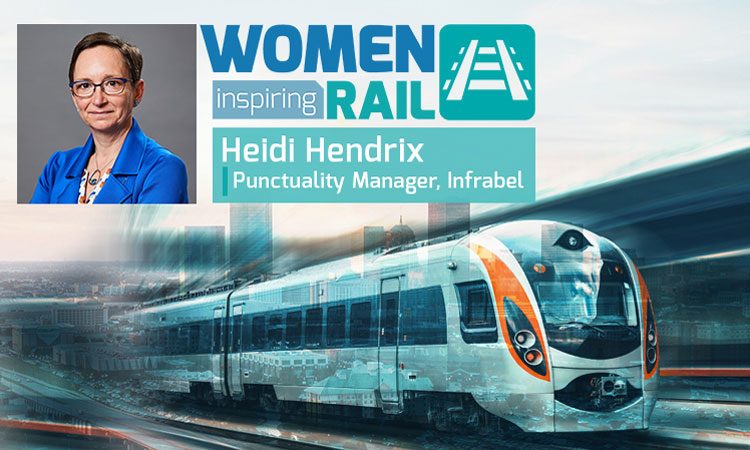Women Inspiring Rail: A Q&A with Heidi Hendrix, Punctuality Manager, Infrabel
Posted: 14 October 2019 | Global Railway Review | No comments yet
For our next Women Inspiring Rail instalment, Heidi Hendrix, Punctuality Manager at Infrabel discusses her current role and proudest achievement, plus her views on rail’s role in the future of mobility and how industry reinvention is important to ensure rail continues to be a reliable choice for both passengers and freight.


How did your career in rail begin and what does your current job involve?
My career in the railways began as soon as I graduated in 1997, with a Master’s in Applied Economic Sciences. As the daughter of a railwayman in heart and soul, I knew that the former SNCB was a very large and extremely complex company. But, it is a company with a social mission. Transporting passengers and freight by rail is quite a challenge. Within such a huge company there are growth opportunities for anyone who is willing to commit.
Two things that are always very important for me are commitment and opportunity. Twenty-two years on, I can look back on a career filled with various challenges that were extraordinarily instructive.
Two things that are always very important for me are commitment and opportunity. Twenty-two years on, I can look back on a career filled with various challenges that were extraordinarily instructive.
With the expected problems surrounding the millennium bug, I started work in the ICT Department and became skilled in, among other things, programming and, later, customer care. In the meantime, I obtained an MBA qualification, which certainly helped me to break through into a managerial role. In the Finance Department I was able to further expand my knowledge in the field of cost control, which allowed me to be able to work on preparing the externalisation of the Cargo Department.
All the experience I gained proved particularly useful when, six years ago, Infrabel appointed me as Area Manager North-East, responsible for the operational management of the signal boxes.
For the past nine months at Infrabel I have been responsible for punctuality reporting and following up action plans to improve that punctuality. Needless to say, I don’t do this alone – I can rely on a team of colleagues and the cooperation of people from all the Infrabel management teams, in close consultation with my counterpart at SNCB.
What aspects of your job do you find the most challenging/rewarding, and why?
For me, punctuality is the outcome of efforts to find the balance between the capacity of the infrastructure network and the train services from the different operators, for both passenger and freight traffic. We know that the demand for passenger traffic on each train has seen huge growth in recent years and that strong growth is expected in the years to come.
At the same time, we also want to respond positively to the growing demand from freight operators who, by shifting from road to rail, are contributing towards a solution to the increasing saturation of road traffic.
Consequently, it’s a real challenge to work out how to offer more train services on a network that also needs to be maintained and, at the same time, is subject to changes and modernisation work.
Punctuality measures the extent to which we succeed in offering a quantitative, qualitative and robust service, bearing in mind the network capacity. ‘Measure to manage’, as the saying goes. Based on figures, we conduct analyses and compile action plans along with the departments concerned in order to permanently improve the quality of the services on offer.
It is hugely motivating to be able to contribute to this continued improvement process which is part of Infrabel’s core business: namely a safe, punctual and customer-focused network for the future. Sometimes the improvements are small, and everything seems to go a bit slowly – maybe too slowly. Being able to work transversally with different management teams means that I really enjoy putting effort into the various challenges facing Infrabel, every single day.
What is it about the rail industry that you are most passionate about?
The rail industry must play a crucial role in the future vision on mobility and, in the process, it is being challenged to think very innovatively and disruptively.
The rail industry must play a crucial role in the future vision on mobility and, in the process, it is being challenged to think very innovatively and disruptively. We must, as it were, reinvent ourselves if we want to continue to play an important role, and find a way whereby rail transport continues to be a reliable and privileged choice for passengers or industry when they are organising their travel and transport.
What has been your biggest achievement/proudest moment so far in your rail career?
One thing does stand out; those five years that I was responsible for the signal boxes in Area North-East – being the first woman in the role and not coming from that sector. I wasn’t an expert on the subject but was still able to use my skills in people management to the full, and further build on those skills. Working together with a team of direct reports, each a specialist in his or her field, is a nice experience to look back on. Sometimes it was difficult, too. Being available to staff working in 3×8, whose workplaces were concentrated (meaning that they sometimes needed to work further from home) and with new tools being introduced, necessitating a new method of working, was very challenging. We were able to do this in serene conditions thanks to highly transparent and frequent dialogue with the staff and their representatives, with a great deal of mutual respect. I perceive this as a great achievement.
How has the rail industry evolved since you joined? What have been the biggest changes?
I have seen a company that was organised along very hierarchical lines, with little participation from the people on the shop floor, evolve into a company with a culture where there is room for initiative, participation and dialogue.
I have seen a company that was organised along very hierarchical lines, with little participation from the people on the shop floor, evolve into a company with a culture where there is room for initiative, participation and dialogue. It wasn’t until the end of last century that the customer became king. In 2005, the application of European legislation led to the division of a monopoly into two companies: an operator and a network manager. In the interim, freight traffic was deregulated with private operators. Soon, the issue of deregulation of domestic passenger traffic will also appear on the agenda.
All this requires fundamental changes in management at all levels.
With more women in management roles, these change processes will, without doubt, be coached differently and possibly even better.
Another major change is that the Infrabel EXCOM also finds self-development, diversity, flexibility and even more focus on the wellbeing of its staff very important. In short: the employee is also king, now. Added to that, it is virtually impossible to keep pace with technological evolution. New IT tools, out in the field as well, mean that more and more ‘data driven’ decisions can be taken and so business processes can also be further optimised.
What can be done to diversify the workforce in the rail sector? What advice would you give to those thinking about pursuing a career in rail?
To anyone who is thinking of a career in rail or, then again, to those who think it’s not for them, I’d like to say this: yes, the advent of the railways was in the 19th century, but we aren’t stuck there. If you look a bit further, you will discover a wonderful, high-tech world that is continuously changing and where people are important. A world with many challenges, where you are sure to find a path to suit you; in a highly strategic sector where you can help shape the future of our mobility.
If you would like to take part in the Women Inspiring Rail series, or would like to nominate a colleague to part, please email: Craig Waters, Editor, Global Railway Review.






